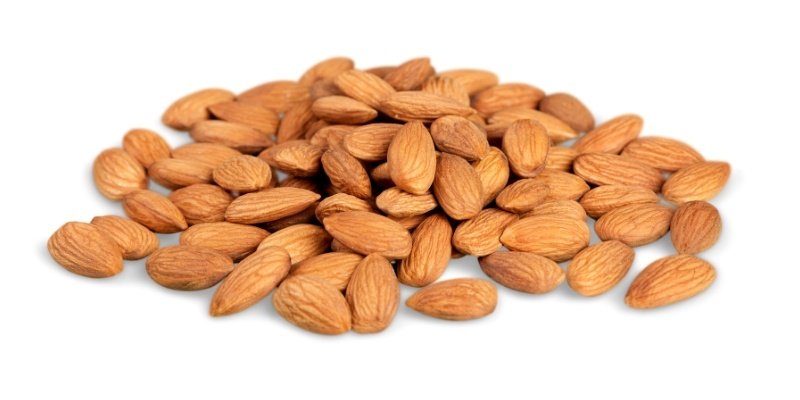Most of the times dogs are quite sure – anything you eat is worth eating and is as pleasing as a chunk of melting juicy steak — even in cases, you are munching on lettuce leaves or nuts! But the truth is that our pets can’t benefit from everything we eat, almonds included.
According to the research database of the United States Department of Agriculture 100g of roasted almonds has 607 calories, 21.43g of proteins, 53.57g of fats (including 3.57g of “questionable” saturated fats and the rest being “good” poly- and monosaturated), 23.33g of carbs including 10g of fiber and some other nutrients: 267 mg of Calcium and 3.6 mg of Iron.
That sounds quite good, right? And even with all those fats, almonds are a great source of nutrients and antioxidants for humans. And those can assist in preventing conditions like cancer, Alzheimer’s disease, and various heart disorders.

But can dogs eat almonds?
When it comes to dogs and nuts, you have to keep in mind that some kinds of nuts can actually be toxic. A straightforward no is for pecans and representatives of the walnut family.
And as assures, Dr. Maritza Perez, DVM, the most common toxic nuts are macadamia nuts, which can cause vomiting, tremors, increased body temperature, and inability to walk.
But how about almonds then? Are they on any lists?
Are almonds toxic to dogs?
Almonds aren’t toxic to canines. However, they can cause a whole array of health issues for dogs and better be avoided.
Almonds are known sometimes to be a perfect sanctuary for one variety of mold named Aspergillus. It contains Aflatoxin, a substance that might provoke poisoning in your dog, as it’s known that pups are influenced by it quite strongly.
Also, almonds might be coated with salt, sugar, or various other flavorings and spices that can be dangerous to canines. Too much salt can begin water retention, which is very serious for pups with heart diseases. When consumed in large quantities (and recommended daily intake is 100mg of sodium per 30lb of pup’s weight), it can definitely be very toxic. Your dog might seem to enjoy spices, but lots of them can trigger stomach upset.
Another danger of feeding almonds to your pet is choking hazards, especially for small pups or those dogs that prefer to swallow rather than chew their food.
And as with practically any food, canines may have an allergic response to almonds. On a rare occasion, it can even lead to a life-threatening condition, called anaphylaxis.
Even if you feed your pup plain, mold-free, seasoning-free nuts, there are still some possible risks. Almonds are rich in phosphorus, and this element might trigger the development of bladder stones. The fat content in nuts can lead to stomach upset in the short term and lead to pancreatitis and obesity in the long run.
A dog’s digestion is not intended to deal with nuts, even if we are talking about tiny serving size. This indicates that dogs require to get their daily nutrients from other possibly less-toxic meals.
The excellent news is that all of those can casually be found in everyday meals that dogs enjoy to eat, like fruits, veggies, and meat. Not to mention regular dog food explicitly designed with pup’s nutritional requirements in mind.
You can check the “Dog Nutrition” section to look for more pup human food inspiration. And we also have two separate articles dedicated to almond butter and almond milk, that you might find interesting.

My dog ate almonds. What should I do?
Pets of various sizes may respond entirely differently to the same serving size of nuts consumed. If your pup eats just a few almonds and isn’t showing any signs of obstruction and choking, there’s little reason to be concerned.
But, If you think your pet ate that huge pack of almonds that you accidentally left by the sofa unattended, the most effective remedy is to provoke vomiting within 30 minutes after the feast. This can be achieved with hydrogen peroxide following the direction of a veterinarian or with the help of poison control. If you are uncertain of when the nuts were eaten, or you cannot start vomiting, then your best possible option is to watch your pet for symptoms of the disease. If your pet grows ill, make an appointment with your veterinarian immediately.
If there are no symptoms of gagging, choking, vomiting, bloating, or any other discomfort, and you think your dog only ate a few almonds, the pup is most likely to be fine and can be taken care at home.

Dogs and almonds. Summary
It’s a fact that dogs genuinely enjoy the flavor of almonds — especially if they are seasoned. Barbecue, Jalapeno, or smoked are reported by dog owners as being their favorite. So they will devour them if the opportunity presented itself. But the dog’s owner has to make sure they won’t.
Canines do not gain any nutritional value from almonds, and those nuts can even cause harm. And we sure you know that even if your pup asks, begs, and go bananas over almonds, there are numerous sounder healthy options for a pup’s treat.
Thanks for the blog graphics: Canva.com


